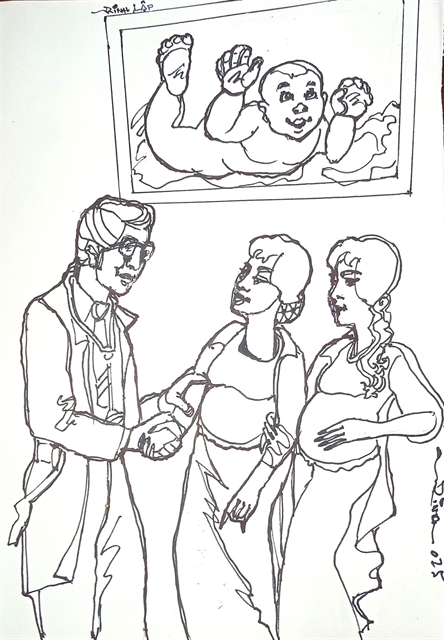The increasing awareness and accessibility of information regarding fertility have shifted societal perceptions. Women are now more comfortable discussing reproductive health and exploring options for preserving their fertility.

Illustration by Trịnh Lập
By Thanh Nga
In recent years, an increasing number of women have chosen to freeze their eggs, a decision often influenced by career aspirations and personal lifestyle choices. Many women today are delaying marriage and motherhood, leading to a surge in demand for egg freezing. But what drives this trend?
Hương Lan, who decided to freeze her eggs on her 28th birthday, embodies this new wave of thinking. Although she is uncertain about marriage, she still yearns for the possibility of motherhood. In a Hà Nội hospital, Lan underwent the procedure and successfully retrieved eight eggs. Despite the discomfort of hormone injections and monitoring, she views the experience as liberating.
“Freezing my eggs gives me a feeling of complete freedom,” Lan said. The financial investment - approximately VNĐ60 million for the procedure and VNĐ7 million annually for storage - was significant, but she believes it’s worthwhile. After witnessing her sister struggle to conceive at 37, Lan recognised the importance of preserving her fertility while she still could.
Similarly, Anh Thư, a sales manager in HCM City, opted to freeze her eggs at 36. After adjusting her diet and health regimen, she successfully froze 16 eggs at a cost of VNĐ80 million, plus annual storage fees.
“Freezing eggs is like buying insurance; no one wants to use it, but it’s reassuring to know I have options,” Thư said.
Both women are part of a growing trend among single professionals in Việt Nam who prioritise personal and career development over traditional timelines for marriage and family.
Changing perspectives
The increasing awareness and accessibility of information regarding fertility have shifted societal perceptions. Women are now more comfortable discussing reproductive health and exploring options for preserving their fertility. This cultural shift empowers women to make informed decisions about their reproductive futures, whether it involves early marriage or opting for egg freezing.
However, this trend is not without its challenges. The fast-paced nature of modern life often leads to increased stress levels, which can negatively impact hormonal balance and, consequently, fertility. Poor dietary habits, including the consumption of processed foods, can also contribute to reproductive issues, making egg freezing an appealing option for many.
Dr Lý Thiện Trung at Mỹ Đức Hospital noted a notable rise in patients seeking egg freezing services. Between 2020 and 2023, around 150 women opted for the procedure at his hospital alone, with the demand expected to grow further. The typical age of women choosing to freeze their eggs is between 32 and 38, with some as young as 25 and others up to 43.
The motivations for egg freezing vary widely. Many women prioritise their careers, delaying family planning until they feel more settled. Others, facing medical conditions that may impact their fertility, seek to preserve their options before undergoing treatments like chemotherapy.
Dr Đỗ Thùy Hương at the Centre for Reproductive Support and Tissue Transplant at Hà Nội Medical University Hospital has witnessed a wide array of motivations among women seeking egg freezing. “What they have in common is independence - financial stability and a solid career,” she said.
A new norm?
Initially, egg freezing was primarily recommended for women undergoing IVF or those facing medical treatments. However, its scope has broadened significantly.
Today, many women who are focused on their careers or who simply have not found the right partner are considering this option. The popularity of discussions surrounding egg freezing on social media platforms further illustrates its growing acceptance.
Despite the interest, cost remains a significant concern for many potential candidates. Prices for egg freezing can vary widely, ranging from VNĐ50 to VNĐ100 million, in addition to yearly maintenance fees. While the optimal age for egg freezing is generally considered to be 25 to 30, many experts suggest that women over 30 without plans for marriage should seriously consider this option.
The decision to freeze eggs represents a significant shift in how women approach their reproductive health. It offers a sense of empowerment and control over their futures, allowing them to prioritise personal and professional growth without the immediate pressure of family planning.
As societal norms continue to evolve, egg freezing may become a common step for women navigating the complexities of modern life. VNS